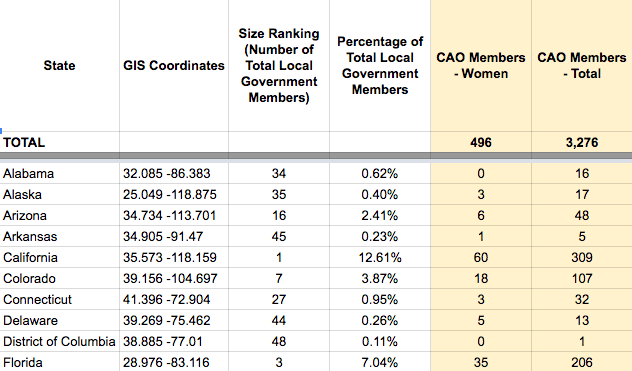Data Download: Measures to Meaning Part I

What can we learn from the data on the numbers of women in local government and the positions they hold?
Data Download: Measures to Meaning is a five part series by Kirsten Wyatt and Stacy Schweikhart about the recently released data on the numbers of women in local government management, as collected and distributed by ICMA.
- Part I: The Data Download
- Part II: Finding Meaning in the Measures
- Part III: Insights and Ideas Challenge
- Part IV: Insights and Ideas Revealed
- Part V: ELGL’s Commitment to Leading Progress
The saying, “what gets measured gets done” was highlighted this week when Melinda Gates authored a column in Marie Claire about how missing data on women’s lives limits global change. Gates wrote, “…unless you can measure a problem—and thereby prove it exists—you can’t start solving it.”
This week, ICMA released data on women in the city management profession. We are passionate about improving the #13Percent statistic, so the measurement (at least of the genders of those serving in local government executive roles) matters.
ICMA shared this data online using infographics which highlighted the total number of ICMA members by state, the number of female chief administrative officers (CAOs, referring to city managers and city administrators), and the number of female assistant CAOs.
Data was arrayed using percentages of the totals, including:
- 6,617 ICMA Full and Affiliate members work for U.S. local governments
- 28.5% of these members are women
- 3,412 ICMA members, or 51.5%, serve as U.S. local government CAOs
- 15.3% of these U.S. local government CAO members are women
- 1,100 ICMA members, or 16.6%, serve as U.S. local government Assistant CAOs
- 37.2% of these U.S. local government Assistant CAO members are women
The genesis for this five part column came as we analyzed the data further and arrayed it in several ways beyond the original ICMA spreadsheet. Then we expanded the analysis to examine the relative size of ICMA membership by state as compared to the data on percentage of women in the profession. With these additional insights, we noticed that while 28.5% of the 6,617 ICMA Full and Affiliate members working for U.S. local governments are women as ICMA displayed, only 8% of the total ICMA Full and Affiliate members working for U.S. local governments are women serving as CAOs and a mere 6% are women serving as Assistant CAOs. To say the least, we were intrigued and thought you would be too.

You can download our enriched data set here.
In the next installment, we’ll share some of our perspectives on finding meaning in the measures.
And then, we want to hear your insights and ideas. What jumps out at you from the data download? And how can we #buildthebench, and better still #balancethebench, to increase the percentage of women in local government leadership?
We’ll conclude this series by sharing your insights and ideas and ELGL’s commitment to making them a reality.
Kirsten Wyatt is the Executive Director of Engaging Local Government Leaders, where this article was originally published. Stacy Schweikhart is the Community Information Manager for Kettering, Ohio.

NEXT STORY: The ‘Most Difficult Day in the History of Orlando’ Prompted a Massive Intergovernmental Show of Force





